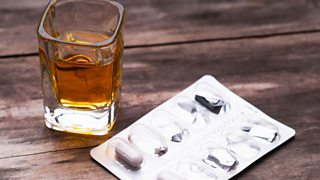What is addiction and can it be successfully treated?

It's complicated - as addiction specialist, Dr Sally Marlow, explains in Radio 4's The Science of Addiction. While addiction is increasingly understood and there are medications and psychosocial treatments that work, there is no "silver bullet" solution.
Addiction isn't a modern phenomenon. It's been around since we first worked out that there are things we can eat, drink, smoke or sniff which will make us feel better. But with all this accumulated knowledge and experience of dealing with the problem, why are addiction rates sky high, and what is the way forward?
What is addiction?
Addiction happens when people take more and more of a drug, until they describe an inability to quit and a loss of control of their drug taking.
At the extreme end of addiction people lose their jobs, their relationships and their homes. Addiction can also result in death. There are many drugs which we know can be addictive. Some, like alcohol and heroin, can cause a physical dependence where the brain and the body move from wanting those drugs to needing them, just to function. Addiction to other drugs, such as cannabis and ecstasy, can be thought of as psychological, where brain processes such as memory and craving drive the addiction and keep a person stuck in it.
We also know that you don’t need a drug to be addicted – some behaviours, like gambling and even internet gaming, are addictive, although the jury is still out about things like food and sex.
Have we always been addicted?
Addiction has been with us since we first worked out that there are things we can eat, drink, smoke or sniff which will make us feel better, at least in the short term. The ancient Greeks and Romans worshipped gods of wine and drunkenness, and in the 1700s in the UK, cheap gin lured more and more people into the taverns. By the 1800s, doctors and scientists were noticing addiction to drugs like opium, which had been initially prescribed for medical reasons. In 1884 there was enough concern that Norman Kerr formed the Society for the Study and Cure of Inebriety, which still exists in the UK today as the Society for the Study of Addiction.
Since then, scientists, clinicians and drug users have come together to answer a range of questions: What is addiction? Why are some drugs addictive? Why do some people become addicted and not others? How can we treat and eventually eradicate addiction?
What can science tell us about addiction?

Over recent decades, we have applied increasingly sophisticated science to understand addiction. Neuroimaging studies and post-mortem examinations of brains show us that certain brain areas and pathways are implicated.
Genetic studies show us that addiction is partially inherited, but that there is no single addiction gene. We also know that, although there is an increased chance that someone whose parents are addicted will go on to develop an addiction problem, it’s by no means definite.
Genes are clearly not the whole story, so we turn to psychologists. They can explain addiction in terms of things like attention, triggers, memory and habit, and have devised increasingly ingenious experiments to investigate these. However, experiments take place in labs which are very different from the real world.
More and more, it is the social sciences that are moving our understanding forwards. Economists can link rates of addiction to supply and demand, and to economic boom and bust. Sociologists can track relationships with disadvantage and discrimination, and note how government policies that affect the environment are also linked to drug taking and rates of addiction.
Can addiction be treated?
We do have treatments for addiction and these treatments work. There are medications, including those which replace a highly addictive form of a drug with a less addictive form – nicotine patches are a good example of this. The idea is that by ironing out the peaks and troughs of addiction, in the short term, people find it easier to quit in the longer term.

Those in recovery from addiction, and the scientific community, all agree that social support is a vital ingredient.
Another example is methadone, a substitute for drugs like heroin and opioid-based painkillers such as codeine. These substitute drugs do work for many people, bringing a period of stability so that other aspects of addiction can be addressed.
As well as medications, there are a range of what are known as psychosocial treatments. These address not only the psychological aspects of addiction, but also the social ones. A person in addiction treatment ideally would receive a range of psychosocial treatments designed for their needs. Ideally this would include one-to-one sessions with an experienced drug worker to explore things like what their triggers are, but also to address other issues like housing and employment. We know that rates of addiction are highest in areas where there is deprivation, discrimination, unemployment and lack of opportunities, and treatment will never solve everybody’s problems unless these big, structural issues are also addressed.
Group sessions are a common and very helpful part of treatment, and sometimes these will be what are known as mutual aid groups, where people who have been through addiction problems help those who are still stuck in them, the most well-known being Alcoholics Anonymous. Interestingly, though, a huge number of people get better from addiction without having any formal treatment at all, which implies that although treatment is vital for many people (probably for those whose addiction is more severe or whose life situation is less stable), for some it’s not necessary.
Regardless of what treatment mix a person has had, those in recovery from addiction, and the scientific community, all agree that social support is a vital ingredient not only to stop using drugs, alcohol, gambling etc, but to stay stopped.
If we know so much about it, why are rates of addiction still so high?
Although we do understand a huge amount about addiction, there is still no grand unifying theory of what addiction is. Although a range of treatments work for many people, there is still no single silver bullet to treat it. One thing everyone agrees is that addiction is chronic (ie. long lasting) and relapsing – this is so integral to addiction that treatment is often referred to as “relapse prevention.”
Progress in addiction science, then, is tricky, but there are layers to the problem beyond the science which make it even more difficult.
Society’s unhelpful attitudes to addiction are proving hard to shift. Addiction is thought of, by many, as a question of morality, character weakness or will power, despite evidence that it is none of these things. Governments will often take a criminal justice approach to addiction, punishing people for their problem, whereas the evidence shows that people are much more likely to get better if you treat their addiction as a health issue.
Then there is the thorny issue of what is addictive and in what circumstances. Drugs, thought of as recreational, may have medical uses, and vice versa. Different drugs provoke different behaviours and are associated with different levels of damage, and these don't necessarily dictate which drugs are legal and which are not.
While some of us who take a drug get addicted and others do not, those in the latter group can find it difficult to understand what happens to those who do. It’s up to all of us, with experience of addiction – whether scientist, doctor, occasional drinker, regular drug user or family member – to try and understand more about addiction and come together to find the solutions.
We have a lot of the knowledge now – perhaps what we are lacking is the will.
-
![]()
The Science of Addiction
Addiction specialist Sally Marlow examines the science behind addiction to find out why so many people in Britain are hooked on drugs and alcohol.

More perspectives on addiction, on Radio 4
-
![]()
Inside Science: Science of Addiction
Adam Rutherford explores the neuroscience, the psychology and the epidemiology of addiction.
-
![]()
All in the mind
Claudia Hammond finds out why MDMA could help treat people with alcohol dependence.
-
![]()
The Untold: Some Mother's Son
Listener Shirley tries to find out the circumstances of her estranged son's death from drink and drugs.
-
![]()
What Makes a Habit an Addiction?
Stand-up Mae Martin draws connections between her obsessive, all-consuming patterns of behaviour





